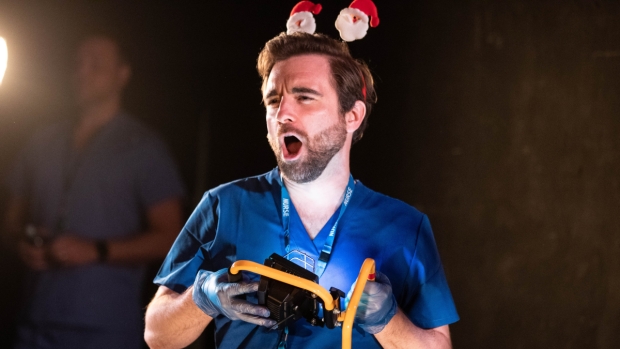La bohème at the King's Head Theatre – review

I must confess a sheltered ignorance of the world of opera up to this point, though it has long existed on the periphery of my theatregoing I have slightly deliberately kept it at an arm's length. This conspicuous cultural blind spot needing rectifying, the King's Head's new queer reimagining of Puccini's La bohème felt as good a candidate as any. Truthfully, lifelong opera sceptics with a preference for musical theatre will find plenty more to enjoy in this than they might expect, not least of all because fans of the musical Rent, Jonathan Larson's 1996 Pulitzer and Tony Award winning rock opera based on Puccini's work, can expect to encounter persistent familiarities as the characters, plot points and even musical motifs to which Jonathan Larson affectionately nodded.
Admittedly, this is opera-lite and is particularly far flung from the grandeur of London's opera houses, not least of all in its comparatively very affordable ticket price. This production, intimately staged in the back room of an Islington pub, is understandably threadbare, with a significantly reduced orchestration. It is a testament to Puccini's composition that the melodies still soar with undeterred vigour. Equally the four act opera has been condensed to just over 80 minutes which run without an interval, and benefits from a fast-paced and compelling exposition, although consequentially the lengthier, more morose third and fourth acts feel somewhat unearned.
The King's Head Theatre has some history with La bohème, as does cast member and co-librettist Philip Lee, who previously played Rodolfo in OperaUpClose's Olivier Award-winning mounting of the show, seen at the same venue. This time, however, Rodolfo has become Robin and Lee has traded this role entirely to play a gender-swapped Mimi (really Lucas using an online pseudonym presumably preserved to aid lyrical scansion). Lee's Mimi is carefully layered, full of intricacies and complexities that never quite fully expose themselves to the audience. Vocally, his performance is also well characterised, with a false fragility that gives way into passionate strength at each emotional climax. As his lover, Robin, Daniel Koek revisits his classical roots having become widely known in the United Kingdom for his musical theatre roles in Les Misérables, South Pacific and West Side Story. The power, sweetness and stratospheric height of Koek's soaring voice is breathtaking, a perfect companion to his emotive and honest acting performance.
Puccini's cast of characters has been stripped back to a quartet which is completed by Matt Kellett as Marcus and Grace Nyandoro as Marissa (modernised names which resemble both the Italian originals and their Rent counterparts). Kellett is a wonderful comic presence with hungrily bulging eyes and a deeply resonant baritone. As his paramour Marissa, Nyandoro showcases her effortless lyric soprano chops and relishes the opportunity to indulge in the playful new libretto. "Musetta's Waltz" is a glorious highlight.
The piece is puzzlingly staged in a hospital, a love story re-enacted retrospectively in this setting, a framing device which does more to undermine the lush, romantic tone than it does to create atmosphere. Though there is some payoff in the show's conclusion, it means the cast must contend with a set and costuming which is needlessly clinical and consistently at odds with the desired tone of each new scene. For this to be a queer reinvention feels high concept enough without this.
Likewise the piece's final moments felt lacking in conviction: an emotionally frantic sequence is fatigued both by bafflingly plodding sections of the score and a conspicuous decision to have Lee's Lucas facing almost exclusively upstage. There is much in the Mark Ravenhill's thoughtful direction, however, with some thrillingly spirited audience engagement and particularly clever use of lighting – individual, portable footlights prove both practical and effective and when the juddering reveal of cold, overhead lighting is brilliantly jarring.
The new modernised libretto from Lee and musical director David Eaton is also completely charming – something about being in a pub theatre and hearing passionately sung references to Uber and Lidl simply feels correct. This being said, a conspicuous inaccuracy arises when, after meeting on the gay dating app Grindr, Lucas admits "nearly swiping left" – clearly a feature of alternative apps such as Tinder – while it's absolutely acceptable to have both, I feel La bohème ought to make up its mind.
Even the most timid of opera virgins have no reason to resist this raucous reinvention of the rhapsodic romance, the luscious melodies and splendid singing remain but the current, queer context is new and quite lovely, and the marriage of the two is a happy one.
– Mickey Jo Boucher – @MickeyJoTheatre










